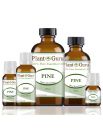Pine Essential Oils
Thanks to the plethora of beneficial health properties attributed to these essential oils, they have become one of the most well-known oils involved in aromatherapy. Pine essential oils have also enjoyed a high level of success with aromatherapists because they blend well with oils such as juniper, sage, lavendin, rosemary, cedarwood, and more. And their non-toxic nature makes them useful in any number of additional applications. Derived from twigs and needles of the common pine tree through steam distillation, these oils end up having a thin consistency with an aroma that is best described as ‘foresty’, sweet, fresh, and crisp. They are currently in use worldwide, but it is believed that these essential oils originally were used in Russia and Austria.
Overall Benefits of Pine Essential Oils
- Can assist in curing colds and their associated coughs, and other respiratory issues
- Useful in the treatment of athletes foot, sports injuries, cuts, and boils
- For urinary tract infections, these are a natural remedy
- May improve eye health and metabolism
- Have been used to treat inflammation, arthritis, and joint pain
- May stimulate the quantity of urination and its frequency
- Possibly useful in reducing incidences of gallstones and inflammation of the gallbladder
- Have been utilized in the treatment of scabies, eczema, pimples, and psoriasis
Uses for Pine Essential Oils
When many individuals think of the types of pine trees from which these essential oils are derived, they think of Christmas. For that reason, potpourri and other air freshening products are making use of these essential oils at a high level – particularly around the holidays. Also in reference to the pine trees mentioned here, they are so abundant that the oils are widely available. This attributes to their economical price range and increases their popularity.
Precautions
Though one of the safest essential oils in use, inhaling excessive amounts has caused minor respiratory irritation in certain, sensitive individuals. These essential oils should not be consumed internally, and pregnant women should seek the advice of their physician before using any essential oils.


